Confessions of a Retail Salesperson
Going shopping for a new pair of shoes or a fresh shade of lipstick can be a cathartic experience. Research shows that even small purchases can be confidence boosters and act as stress relievers. Shopping is supposed to be a fun, relaxing activity.
Unless, of course, you're the person behind the cash register.
The hassle of working in retail isn't just a secret shared between department store employees. Demanding customers, long hours, and even bizarre interactions have inspired books, TV shows, and memes chronicling the highs and lows of being at the mercy of customers.
So just how bad do retail employees really have it, and what makes their jobs so annoying? To find out, we surveyed over 1,000 current retail employees to get their perspective on the other side of retail therapy. Want to know what they really think when they say "the customer is always right"? Read on as we ring up their answers.
Retail Pet Peeves
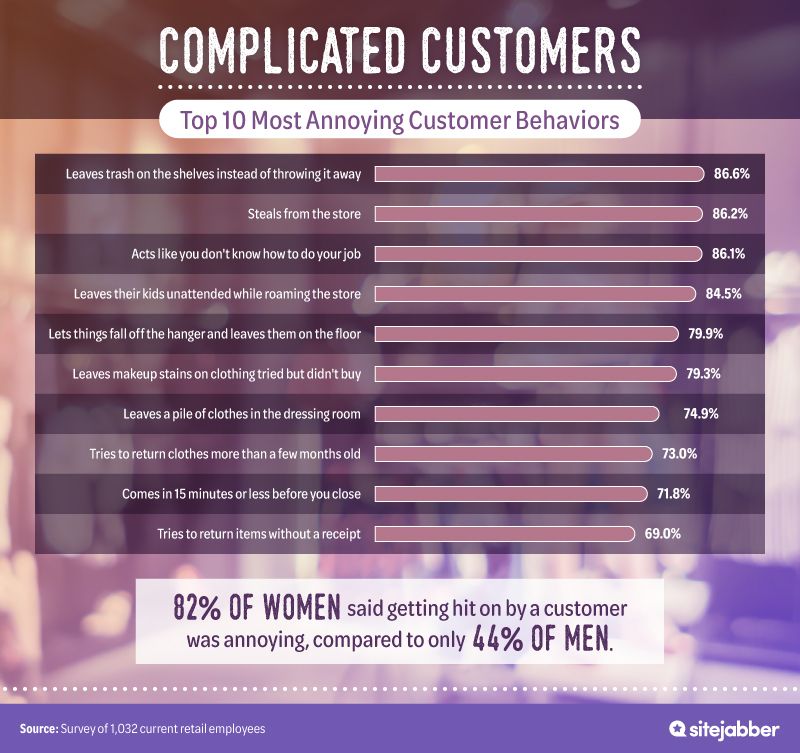
When it comes to the ultimate shopping experience, quality customer service can go a long way helping brick-and-mortar stores stand out in the age of digital commerce. Of course, what a sales associate says to your face and what they really think when helping you might be a matter of your own behavior.
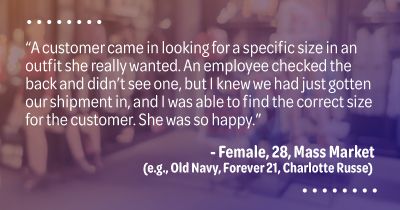
When asked about the most annoying customer behaviors, nearly 87 percent of retail employees agreed their biggest pet peeve was customers leaving trash on the shelves instead of throwing it out. This was considered worse than stealing from the store or customers acting like employees don't know how to do their jobs.
And if you're shopping for clothes, try to avoid getting on the bad side of your shopping attendant. Roughly 3 in 4 retail employees were also annoyed when customers let clothes fall off the hangers, left makeup stains on try-on items or piles of unwanted garments in the dressing room, and tried to return things more than a few months old.

One in 3 people working in retail also admitted they would avoid a customer who didn't fit their typical shopper demographic.
Committed to the Cause
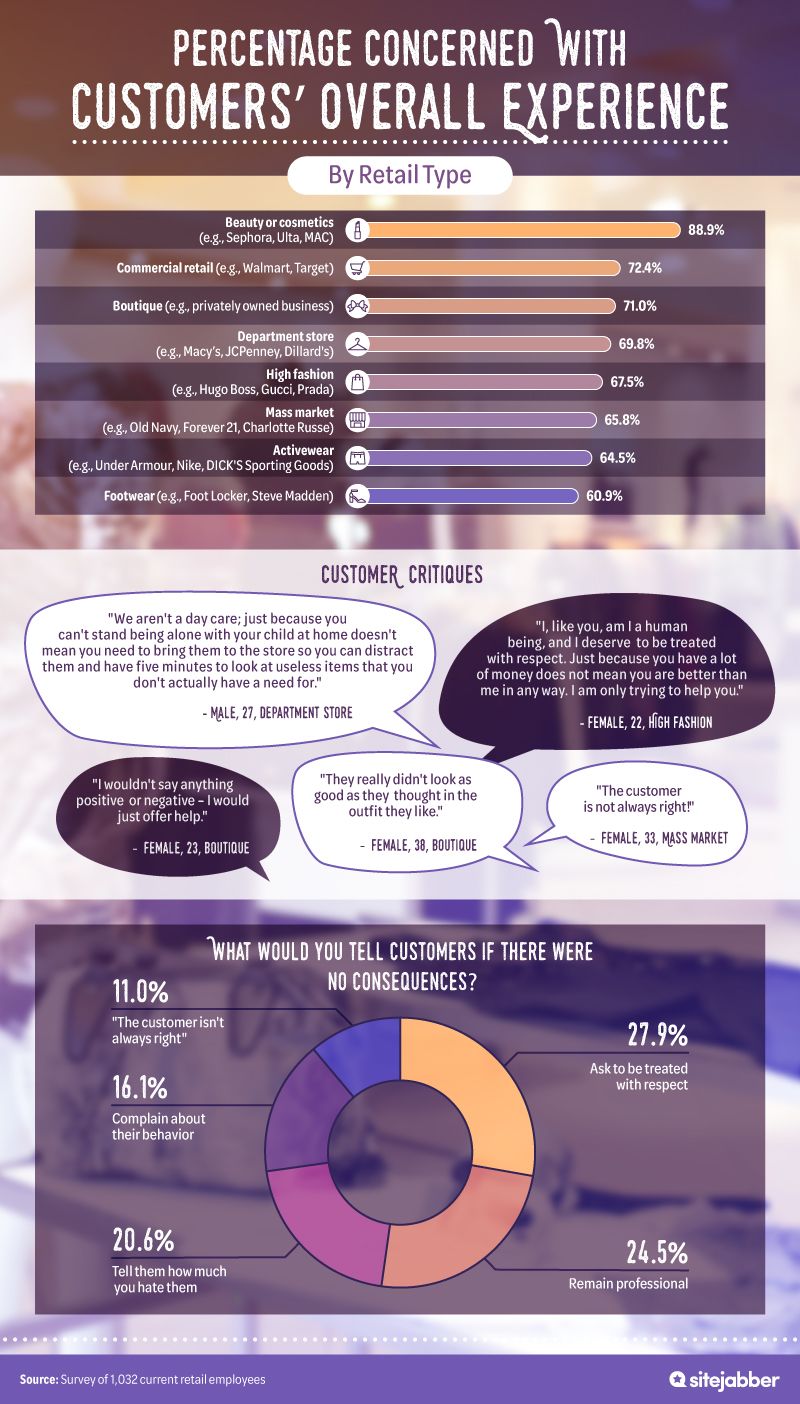
Even though retail employees were willing to open up about customers' actions that left them heated, they also told us how invested they were in making sure shoppers had the best possible experience in their store.
Almost 90 percent of retail employees in beauty or cosmetics said each customer's overall experience was an important part of their job. Beauty retailers like Sephora are attempting to elevate their in-store experience for guests looking to do everything from test out new products to have their makeup done on the spot. Recently, Sephora even announced a nationwide beauty class for men and women with cancer.
Over 72 percent of people working in commercial retail like Walmart and Target had the same perspective about their customers. You might not get the same level of focus if you're buying a new pair of shoes or shopping for yoga pants, though. Less than 65 percent of people selling activewear and nearly 61 percent of footwear employees felt committed to their customers' overall experiences.
A vast majority of retail employees don't necessarily hate their job or the people they work with. Even if there were no consequences to their actions or words, nearly 28 percent would simply ask to be treated with respect, and about 25 percent would choose to remain professional. However, 1 in 5 retail employees would tell a customer how much they hated them, and 11 percent would want their guests to know the customer isn't always right.
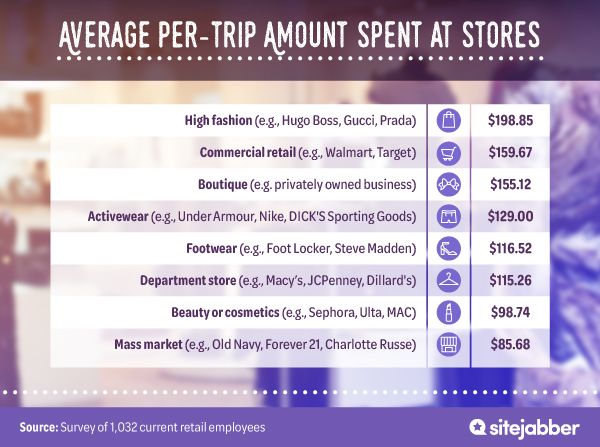
Spending more money at certain types of stores won't always guarantee you the best service. While people working in beauty or cosmetics cared more about their customers' experiences, the average amount of money spent per trip at a store like Ulta or Sephora was less than $99. In contrast, employees in high fashion were slightly less invested, even though customers there spent roughly double on a standard purchase.
Paying for Positivity
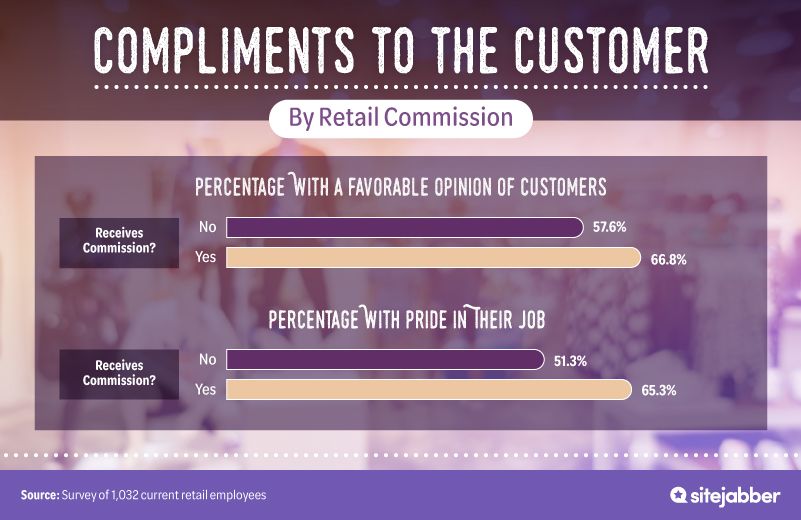
As we found, the good experiences actually outweighed the bad when it came to retail customers, but earning a little extra cash from their sales might help bolster that positive sentiment.
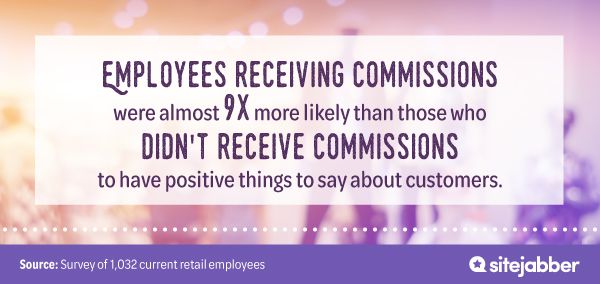
While nearly 58 percent of employees not earning a commission said they had a favorable opinion of customers, close to 67 percent of commissioned staff members said the same.
Taking home a bigger paycheck at the end of the day could also help retail employees feel more emotionally attached to the work they do. Even though more than half of noncommissioned store attendants were proud of their job, that attitude increased to over 65 percent among people taking home an incentive from their sales. In 2017, Walmart was the biggest employer in 22 states, and in 2018, the retail goliath announced it would increase starting wages to just $11 an hour.
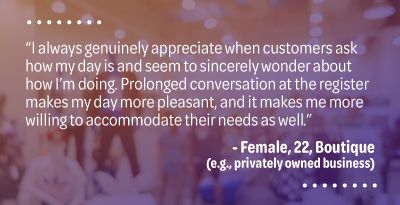
Do Unto Others When Shopping for Shoes
Whether you're buying the necessities or are just looking for a treat, shopping is supposed to be a fun experience. And while retail employees have a few customer pet peeves, many love the opportunity to help guests make their purchases with ease. As their stories show, just asking the cashier how their day is going or letting them know how much you appreciate their help can go a long way in brightening their day, however hectic it may be.

If you want to stay on their good side, put your trash where it's supposed to go and leave the dressing room as clean as you find it. And if you want to ensure you're getting the best service possible before you even walk in the door, let Sitejabber be your guide. With thousands of unbiased reviews, you'll get a first-hand look at what to expect from the customer service, answers to some of the most commonly asked questions, and honest reviews you can trust. At Sitejabber, our mission is to empower buyers in their shopping decisions. See for yourself by visiting us online today at Sitejabber.com.
Methodology
For this project, we surveyed 1,032 current retail employees using Amazon's Mechanical Turk. The respondents consisted of 51 percent men and 49 percent women. The average age of respondents was 33 years old with a standard deviation of 10.4.
This project relied on a self-reporting survey, and these results have not been statistically verified. Therefore, this project is intended for entertainment purposes only.
Sources
- https://www.tinystep.in/blog/5-scientific-reasons-why-shopping-makes-you-happy
- https://www.goodreads.com/book/show/6670928-retail-hell
- https://www.adweek.com/tv-video/target-is-everywhere-in-tonights-episode-of-nbcs-superstore-including-the-title/
- https://yourfriendshouse.com/opinion/the-can-i-speak-to-the-manager-haircut-is-a-very-real-phenomenon/
- https://www.forbes.com/sites/louismosca/2018/01/05/saving-your-retail-business-from-the-chopping-block/#15df0c77591a
- https://www.shopify.com/retail/5-examples-of-retailers-offering-elevated-customer-service
- https://people.com/style/sephora-nationwide-beauty-class-people-with-cancer/
- http://www.businessinsider.com/the-biggest-employer-in-every-us-state-2017-11
- https://www.forbes.com/sites/eriksherman/2018/01/14/4-hard-facts-about-walmarts-touted-new-11-entry-wage/#73af4a456660
Fair Use Statement
Think your readers can relate to some of these shopping perspectives? You don't need to see our manager to share this story on your own site for noncommercial use. Just make sure to include a link back to this page so that our contributors get credit for their work too.
